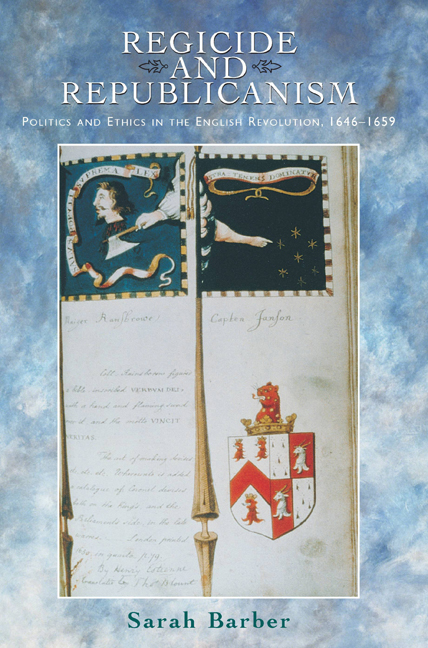Book contents
- Frontmatter
- Contents
- Preface
- List of Abbreviations
- Introduction: Regicide and Republicanism
- 1 Unparliamentary Language and the Dignity of the Crown
- 2 ‘A Mere Man’: Charles Levelled
- 3 The Expense of Blood and Treasure
- 4 King Ahab
- 5 Queen Justice
- 6 Government New Modelled?
- 7 The Engagement of Loyalty
- 8 The Active and the Passive Life
- Epilogue: The Good Old Cause
- Select Bibliography of Printed Sources
- Index
Epilogue: The Good Old Cause
Published online by Cambridge University Press: 03 October 2020
- Frontmatter
- Contents
- Preface
- List of Abbreviations
- Introduction: Regicide and Republicanism
- 1 Unparliamentary Language and the Dignity of the Crown
- 2 ‘A Mere Man’: Charles Levelled
- 3 The Expense of Blood and Treasure
- 4 King Ahab
- 5 Queen Justice
- 6 Government New Modelled?
- 7 The Engagement of Loyalty
- 8 The Active and the Passive Life
- Epilogue: The Good Old Cause
- Select Bibliography of Printed Sources
- Index
Summary
Republican fortunes revived at the end of the decade, highlighting the tension between those who acted and those who thought. When Oliver Cromwell died, in September 1658, much of the traditionalism, restraint and reaction which had crept back into English politics were blown away again. Mercurius Politicus reported that his ‘most Serene and Renowned Highness’ was interred with great ceremony, his effigy wore a ‘Royal large robe’ and the ‘Cap of Regality’, and the Protector had all the honours reserved for a king, except to be called one. In accordance with the Humble Petition and Advice which gave him the right to nominate his successor, he chose his eldest son, Richard, as Protector. The army approved:
being resolved to their utmost to maintain the Succession, according to Law: Which … speaks them men of Honor, Prudence, and Fidelity, mindful of the merits of their late great Leader, and common Father, and of the grand interest of the Establishment, after all our shakings; so it is but answerable to the worth and nobleness of his Son, who in all respects appears the lively image of his Father, the true Inheritor of his Christian Vertues; a person, who by his Piety, Humanity, and other Noble Inclinations, hath obliged the hearts of all.
The army grandees - nicknamed the Wallingford House group after Lambert's London residence in which they met — and the persons which they approved to lead the government were men of such high qualities that the balance of the ‘establishment’ would remain in equilibrium.
The quiet succession which was the hope and expectation of the editorials of Mercurius Politicus was disturbed by an upsurge of political activism and writing, sparked by the leader's death. The most vocal campaigners against the continuation of the Protectorate were the proponents of the Good Old Cause. The ‘cause’ had a long history. The earliest use of the phrase which this study has uncovered dates back to 1648 when Sir Arthur Haselrig urged common action for the ‘ould cause’. Its usage became more common as a description of republicanaction almost as soon as the Protectorate was established, but the term is more often dismissed as ‘a catchy shibboleth … used as a point of departure from which historians have ridden off in various directions’, or worse, a ‘facile catch-phrase’, a ‘parrot-cry as a substitute for thought’, which measured the decline from the principles of 1640s’ action and 1650s’ thinking.
- Type
- Chapter
- Information
- Regicide and RepublicanismPolitics and Ethics in the English Revolution, 1646–1659, pp. 229 - 239Publisher: Edinburgh University PressPrint publication year: 2020

